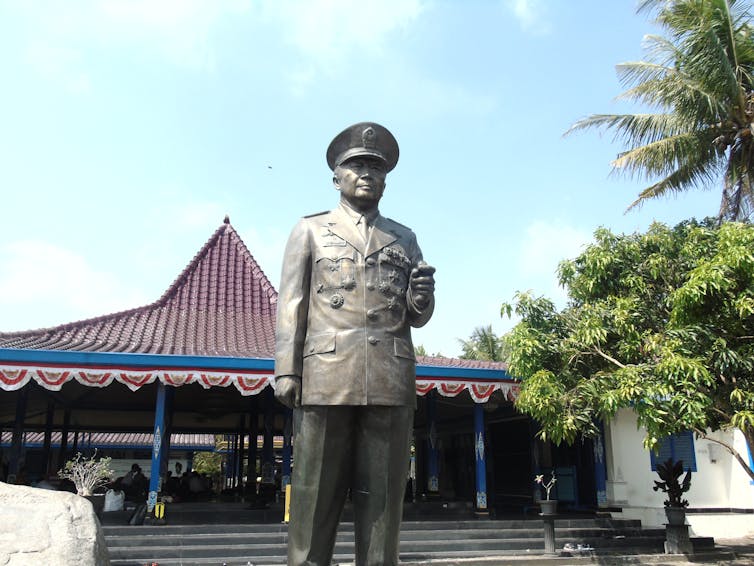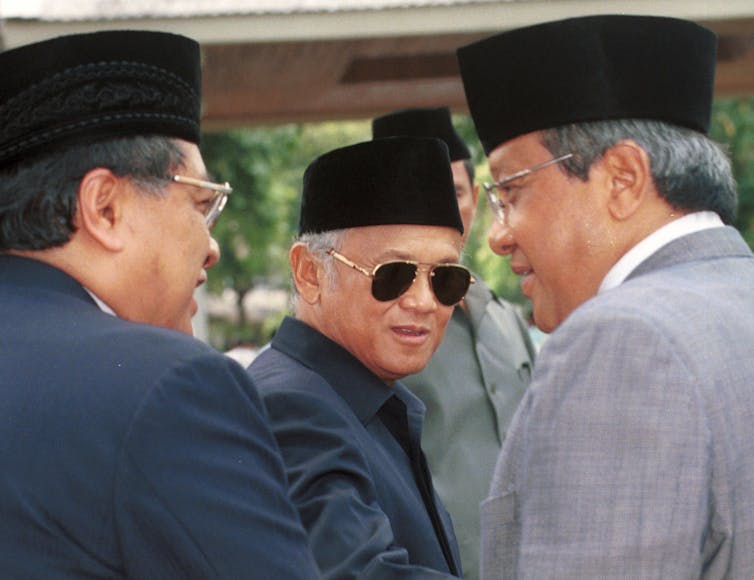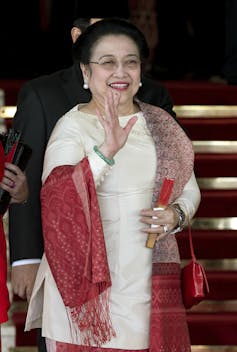Indonesia’s next general elections are not until Valentine’s Day 2024. But in Indonesian politics, that is not far away. The country’s oligarchic political elites are already manoeuvring to maintain their grip on power, and some don’t want to face the polls in two years.
Powerful figures, including coordinating ministers Luhut Binsar Pandjaitan and Airlangga Hartato, who is also chair of the Golkar Party, are suggesting the elections should be deferred to give incumbent president Joko Widodo (Jokowi) more time to deal with the consequences of the pandemic.
Others are even calling for the constitution to be amended to allow presidents to stay in office for three consecutive terms instead of two, paving the way for Jokowi to run again in 2024.
Although Pandjaitan recently claimed unspecified “big data” shows 110 million Indonesians support postponement of the elections, polling suggests there is very limited public support for it.
Jokowi has not publicly endorsed postponement or a third term , but Pandjaitan – the ubiquitous “minister for everything” – is very close to Jokowi, and many suspect Jokowi is open to extending his time in office.
In any case, these proposals have been around for a while and just won’t go away – and they are generating huge controversy.
Term limit at the heart of Indonesian democracy
It is not hard to understand why. Over the course of his second term, Jokowi has deftly built a fractious but formidable coalition of powerful allies and former enemies, including party leaders and powerful tycoons. This coalition now dominates Indonesian politics.
If Jokowi were re-elected, it would continue to give his elite supporters unfettered access to the considerable financial benefits that come with power in Indonesia – precisely what the two-term limit is intended to prevent.
After more than three decades in power, former President Soeharto’s authoritarian, army-backed New Order regime collapsed in 1998. Under his rule, corruption and denial of rights had became institutionalised as the elite plundered the economy.
Read more: Soeharto: the giant of modern Indonesia who left a legacy of violence and corruption
Political leaders trying to keep power and hold the country together in the chaos that followed his resignation were under massive popular pressure to make the country’s rulers more accountable. This triggered four years of constitutional amendment that reinvented the Indonesian polity, moving it decisively away from dictatorship and towards liberal democracy.
The two-term limit was a centrepiece of the First Amendment to the Constitution in October 1999. It was intended to prevent the rise of another dictator like Soeharto and his predecessor, Soekarno, who had once been declared “president for life”. The change was of enormous symbolic importance.
In fact, it was at the heart of the Reformasi (Reformation) agenda, along with free elections and the removal of the armed forces from politics. Reversing this would be a huge blow to Indonesia’s fragile democratic system.

Reviving the People’s Deliberative Assembly
Proposals for the removal of the two-term limit are not the only evidence that elite enthusiasm for Indonesian democracy may be wearing thin. There is another constitutional amendment proposal closely linked to it that could also be very damaging: the reintroduction of the New Order’s GBHN (general outlines of state policy), now to be called the PPHN (state policy guidelines).
Under Soeharto, these five-year plans were used by a sort of super-legislature, the MPR or People’s Deliberative Assembly, to set the government’s policy program. In theory, the president, who was not elected, was selected by the MPR to implement the GBHN, and had to deliver an “accountability speech” to the MPR to retain its support. If the MPR rejected that speech, it could remove the president.
This was all just a formality under Soeharto, because he had an iron grip on the numbers in the MPR. However, the potential of the GBHN system to control the president became clear when Soeharto’s successor, President Habibie, abandoned his plans to retain the presidency after the MPR rejected his accountability speech in 1999.
So, if the Constitution is amended to give the MPR power to issue PPHN, it follows that a similar mechanism might seem necessary to make the president accountable to the MPR for implementing them. This would be huge power-grab by the MPR, which now has far more limited powers than it did under Soeharto (again, a result of the post-Soeharto constitutional changes).
The MPR today can’t do a great deal more than amend the constitution, but it could use that crucial power to re-introduce the PPHN and win power over the president and, in doing so, the government.

Moreover, if the MPR makes the president accountable to it for implementing the PPHN, and is therefore able to more easily remove him or her, the question will inevitably be asked – why shouldn’t the MPR also be able to choose the president, as it did under the New Order?
In other words, it would not be a huge leap from implementing the PPHN system to ending direct presidential elections.
Read more: A requiem for Reformasi as Joko Widodo unravels Indonesia's democratic legacy
Reimagining Indonesia
It is no accident that Bambang Soesatyo, the current chair of the MPR – naturally, a strong proponent of the PPHN – has also previously also called for the MPR to have the power to appoint the president.
Imagine Soesatyo’s power if he gets what he wants: the MPR would have the power to set the government’s policy agenda, and it might also end up being able choose the president, hold the president accountable to PPHN, and let him or her have more than two terms.
But imagine if a president then gained control of the MPR – he or she could stay in power indefinitely. That would mark the return of very substantial part of Soeharto’s New Order system.
None of this is impossible. Jokowi’s government more or less controls around 80% of the DPR (that is, 460 of 575 DPR seats, including every party but two small ones).
The MPR is a joint sitting of the DPR and another body, the otherwise powerless Regional Representative Assembly (or DPD). But by law, the DPR always constitutes two-thirds of the MPR. This means the government is not far from having numbers in the MPR it needs to initiate amendment of the Constitution (two-thirds, or 474 of the 711 MPR seats).
If Jokowi’s DPR coalition was solid (and that would involve a lot of “money politics”) it would be short by just 14 people in the MPR. It might be able to make up this number from DPD members, perhaps by offering the DPD a more meaningful role.
Is a political deal to remove the presidential term limit in return for giving the MPR the power to issue PPHN and maybe even appoint the president out of the question? Put another way, could the MPR force Jokowi to agree to the PPHN in return for removal the two-term limit and letting him run again?
Not now, but not impossible
For now, none of this happening – not yet, at least. There is still anxiety, even fear, among oligarchs and party bosses about the dangers of restarting the amendment process that delivered such vast change between 1991 and 2002. Once that door is opened, and the entire Indonesian system is up for grabs, who knows where it might lead?
A clear and settled – and very expensive - intra-elite deal locking in almost all the parties and most major political players would be needed to amend the constitution, and that has not yet been achieved.
But Indonesia’s political landscape can change very quickly when the elite agree it should. That’s why senior figures like Pandjaitan and Hartoto are still pushing hard to postpone the 2024 elections.

Islamic identity parties PKB and PAN have come out in support of postponement, but the chair of Jokowi’s own party PDI-P, former president Megawati, and the chair of the Gerindra Party head and Defence Minister, Prabowo Subianto, have both opposed it.
But if they, and other powerful figures like the chair of the National Democratic (Nasdem) Party, media tycoon Surya Paloh, can be persuaded to back postponement, it could still happen, and the reasons given won’t matter all that much. In recent years, the elite have shown that, if united, they are willing and able to stare down huge popular protests.
And if the elections are delayed and Jokowi retains office, an intra-elite deal with the MPR to amend the constitution and begin dismantling democracy would start looking a lot less difficult.
Tim Lindsey has received funding from the Australian Research Council.
This article was originally published on The Conversation. Read the original article.







